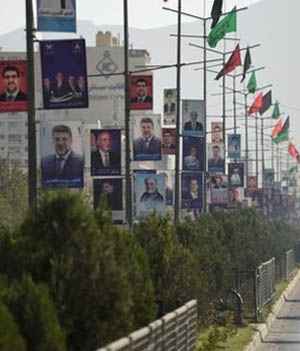Supporting elections in Afghanistan weakens governance

By Nafay Choudhury
Few rights seem as inalienable to Americans as the right to vote. Images of the 1913 women’s suffrage parade on the streets of Washington, or the 1965 protest in Selma, Ala., demanding federal voting rights for African Americans, are permanently etched into the DNA of our society. Elections are synonymous with democratic governance. It is thus no surprise that in Afghanistan, periodic elections, even if far from perfect, have come to be viewed as one of the triumphant American legacies after our nearly two decades of presence in the war-torn country.
Afghanistan now heads towards its fourth presidential elections, scheduled for Sept. 28, since international efforts to reconstructed the country commenced in 2001. Many, including Tadamichi Yamamoto, head of the United Nations Mission in Afghanistan, view these elections as a significant next step in the country’s slow progression towards becoming a prosperous, democratic polity.
However, we need to seriously consider the possibility that elections do not always go hand-in-hand with democratic governance and, in certain instances, may even undermine it. Let’s look at Afghanistan more closely.
Following the 2014 elections, the country’s economy was on the brink of collapse and, although attributed to a number of factors including the withdrawal of American troops from the country, one reason was the protracted power struggle between the two leading candidates, Abdullah Abdullah and Ashraf Ghazi, causing a government stalemate for nearly three years. Investors pulled money out of the country over the political uncertainty of its future.
Even more concerning is the manner in which Afghan elections have galvanized ethnic divisions. Studies of previous presidential elections reveal that electorates almost exclusively have voted on ethno-linguistic lines, thereby worsening ethnic divides, which in turn worsen inter-ethnic relations in the country.
In sum, elections weaken governance throughout Afghanistan by draining limited resources and intensifying ethnic divides that drive internal conflicts.
This is not to say that the importance of elections should be trivialized, since they provide a basis for other liberties such as freedom of expression, peaceful assembly and protection from discrimination. However, democratic governance requires a baseline of security and economic opportunity, only after which a democratic culture can grow. As it currently stands, illiteracy in Afghanistan hovers at 70 percent and the Taliban control nearly 50 percent of the country. For this reason, faced with the prospects of elections in a country with a bleak future, many educated Afghans are simply choosing to leave.
The breakdown of peace talks between the U.S. government and the Taliban further complicates these elections. Presidential hopefuls are keen to assert the absolute authority of a democratically elected government in any negotiated peace. However, a potential power-sharing agreement would require a leader capable of accommodating wildly disparate views, rather than a technocratic leader who seeks to consolidate power. Presidential frontrunner and incumbent Ashraf Ghani, dubbed “the president who won’t leave the palace,” may risk finding himself outside of its gates in an eventual power-sharing agreement given his uncompromising stance towards the Taliban. Elections would allow him to protect his personal political aspirations through the veil of democratic legitimacy.
International efforts geared at post-conflict state reconstruction in Afghanistan need to be directed towards attainable goals that provide the population — not simply political elites — with tangible benefits. In practical terms, this means eschewing staunch insistence on procedural democracy and replacing it with an emphasis on "good enough” governance, which focuses on establishing basic security and job opportunities. These two factors can help foster a rising middle class — one that does not prioritize escaping from the country — that can advocate for accountability and the rule of law. International funding should be earmarked to initiatives that strive for these much more modest objectives that directly support the livelihood of Afghan citizens.
Unfortunately, in the days leading up to the upcoming Afghan presidential elections, a familiar story seems to be unfolding. The U.S. has committed $29 million towards the elections budget; another $90 million will come from Kabul government. Meanwhile, the country is becoming increasingly engulfed in insecurity, costing innocent lives and making it impossible to attract the foreign investment needed to strengthen the economy.
We need to exercise caution when rhetoric becomes righteous and calls for elections are treated as an unassailable virtue. Establishing stability and order in post-conflict settings such as Afghanistan is incredibly complex. However, the challenge becomes all the more unattainable when we set out with the wrong goal in mind.
The article was first published in The Hill on September 18, 2019.
Nafay Choudhury is a residential fellow at the Institute for Global Law and Policy at Harvard Law School and a research fellow at the Afghan Institute for Strategic Studies. He is a doctoral researcher at King’s College London.
Academicians and Officials interested to publish their academic pieces on this page, please approach us through: opinions@aiss.af
The article does not reflect the official opinion of the AISS.
